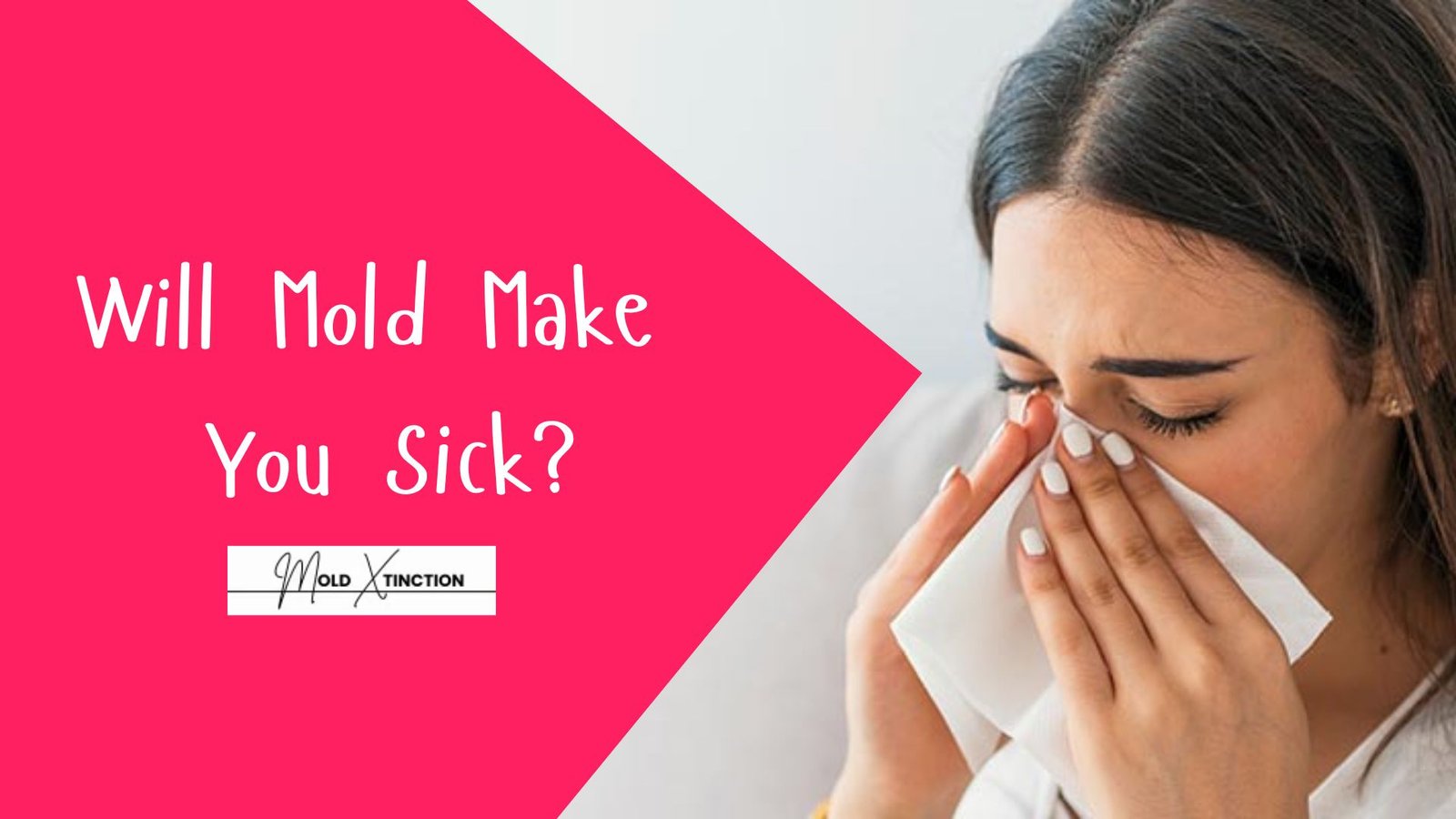So, will mold make you sick? Yes, mold may cause you sickness in many ways and you may not even realize that you are sick.
Not every symptom can be seen, and you might be completely unaware that it is due to mold. It seems to be a small harmless spot on the wall, but it is something that is highly dangerous.
The spores of the mold fall into the air.
You can’t see them, but they are floating around in the air and will be absorbed in your lungs when you breathe.
Such spores can affect not only you but your family members, especially if they have kids, the elderly, or individuals with sensitivity or asthma. The problem is that mold doesn’t just stay in one area; it can spread fast around the house.
That’s why you should not ignore mold and treat it when it’s still small; otherwise, it will grow big in no time and will affect not only your house but also your health.
This is a comprehensive article to keep you safe and on guard. Read carefully.
What's In This Article
ToggleWill Mold Make You Sick?

Definitely. Mold can cause you to become sick.
Mold grows small particles of fungi known as spores. These are airborne spores which can easily be inhaled to your lung. Once inside your body they are able to cause the illness.
For some, it comes immediately. For some, it takes a little while. But here’s the thing, inhabitants of moldy homes can never be entirely safe – not even with all the mold evidence not visible to the naked eye.
1. Breathing and Lung Problems
One of the most common types of influence of mold on you is through the lungs. Inhaling the mold spores may cause a nose, throat and lung infection.
You can develop symptoms such as:
- Coughing
- Sneezing
- Difficulty in breathing
- Chest tightness
- Wheezing during breathing
Mold worsens asthma when you already have the disease.
It may lead to more asthma attacks and difficulty in breathing despite the medicine that you have taken.
It is also possible that the signs of other lung based illness, such as bronchitis or chronic sinus complications, will be worsen.
2. Allergic Reactions
Mold is an allergen, and millions of people are allergy sufferers and don’t even know it. Allergies occur when your body responds to a substance or element that is harmless.
The symptoms of mold allergy are:
- Runny nose
- Itchy eyes or watery eyes
- Red rashes or skin irritation
- Sore throat
- Non-stop sneezing
- Post-nasal drip
They tend to occur when you are in your house, and they normally occur in rooms where there is mold such as the bathroom, basement or the kitchen area. You will be feeling normal after a walk out, but when you come back home, the symptoms will kick in.
3. Risks of Infections and weak Immune System
Mold is more than an allergy to people with weak immune systems, as they are more likely to get severe infections.
This includes:
- Babies and young children
- Elderly people
- Chemo-therapy patients
- Diabetics or autoimmune people
- Organ transplant patients
When this happens, mold can even reach the lungs and result in serious infections if not treated immediately. Removal of mould is important if you or anyone at home has a weak immune system and you see mould.
4. Constant Headaches and Fatigue
Mold doesn’t just affect lungs or skin. It can also cause headaches, fatigue, and brain fog.
You’ll feel:
- Tired when resting
- Lazy by day
- Confused or forgetful
- Light or sound sensitive
- Headache on your head
These symptoms are not hard to ignore, but if you experience them often – especially at home – mold might be the culprit.
This is because of poor indoor air. Mold spores in the air cause their effect by gradually attacking your brain and body.
5. Mood Changes and Mental Health
Mold in the house doesn’t just affect your physical health; it can also change your emotions.
Research shows that people living in mouldy homes report:
- Anxiety
- Mood swings
- Trouble sleeping
- Depression
- Stress without a cause
You may not relate these feelings to mold, but when the air you breathe daily is toxic, then the mental and emotional side of you will be affected eventually.
Who Is Most At Risk of Getting Sick From Mold?
Mold is not limited to a specific group of people and can be a challenge to any human being; however, there are some individuals who are more prone to infection.
This includes:
- Children, since their lung systems and immune systems are still in the maturation stage
- Women who are pregnant whose bodies are very sensitive
- The old and individuals with persistent health issues
- People that have underlying breathing illness, e.g., COPD or asthma
- Pregnant and breastfeeding women, individuals with weak immune system, and allergies.
One of these should be in your home to make it even more urgent to act fast when mold finally shows up.
Signs Mold Is Making You Sick
You may not always see a mold, but your body can’t hide it. Read the following warning signs carefully:
- You get sick more at home than you do when you’re away from home
- You don’t lose your allergies
- There is a sloppy smell in one of several rooms.
- You observe marks on the walls, floors or even in the windows, ceilings.
- You feel tired, dizzy, or can’t concentrate
- You have a worsening of your asthma symptoms
If you see any of these, don’t just ignore them. It can mean mold is hiding indoors and is silently fighting your well-being.
Is It Safe to Clean Mold Yourself?
If it’s a small mold, such as a small scab on your bathroom tiles, then you can clean it yourself using natural chemicals like vinegar, soda, or even a weak solution of bleach.
But be very careful with mold and leave it to the pros.
Especially if:
- It has spread widely
- It always comes back
- It’s caused by a leak or a flood
- It’s on porous surfaces like carpets, drywall, or wood
- It has been there for a long time
Then it’s not safe to clean it yourself. You might end up spreading mold spores and making it worse.
Why You Should Never Ignore Mold
Others try to paint the mold’s surface or spray air fresheners to mask the odor. This is not the solution to the problem. It just hides it.
Meanwhile, the mold has been:
- Floating sporicidal agents in the air
- Breaking your walls, floors, and ceilings
- Reducing the quality of your indoor air* Get you and your family sick too
Mold will ruin your home and make it uninhabitable and worthless if not treated. A small problem becomes a big repair.
What to Do?
What to do when you suspect the mold is causing illness to you or your family:
- Limit the contamination.
- Air filtrations and open windows.
- Check pipes, ceilings and walls to look out on water leaks.
- Never go into large areas and try to scrub mold by yourself.
- Call a mold remediation expert now.
Why You Need a Professional Mold Remediation Service
The mold specialists have been trained to:
- Detect the presence of mold behind walls, under carpets and under the ceilings that cannot be seen with naked eyes.
- Safe removal of mold uses special equipment, heavy chemicals, as well as safety equipment
- Prevent mold from coming back
- Test and clean the air in your home
- Advice on how to make your home mold-free
Trying to remove mold with the wrong equipment and training is dangerous. You may get sick or transfer mold to other rooms.
Never try to clean up large areas of mold by yourself. The best thing to do is to call a mold remediation contractor to assess and treat your home properly.
It’s safer and more affordable…
👉 When you allow moldextinct.com
👉 to reach out on your behalf.
CONTACT US NOW!
Conclusion
A mold should not be neglected or delayed. It may result in numerous conditions connected with difficulties in breathing and skin rashes, and fatigue, headache, and even emotional stress. The health damage in a moldy environment is directly related to how long you live, and to the difficulty of fixing it. Waiting for a bigger problem to arise is not the solution, especially when you see signs of mold or you have symptoms that seem to worsen at home. Act fast. Your health and your family’s well-being are what matter to you.
Helpful Guide: The Impact of Mold Exposure on the Reproductive Health of Women


